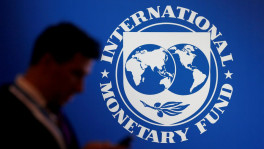Will China confront a revolution of rising expectations?
On top of this is the country’s aging population, which requires shifting investment from industrial capacity to social services. This will imply slower growth insofar as productivity chronically lags in the service sector.

For over a decade, China has accounted for a quarter or more of global economic growth. With its economy currently navigating a rough patch, the question is whether this impressive performance will persist.
Cassandras pointing to the possibility of a Chinese growth slowdown regularly invoke the specter of a middle-income trap. Now that China is no longer poor, they warn, growth rates will fall, just as they have in all but a handful countries that have reached the same income level. Growth is harder, they observe, when it can no longer be based on brute-force capital accumulation. Now, it must be based on innovation, which is difficult to bring about in an economy that is still centrally directed.
Then there is the corporate sector's heavy debt load. A decline in earnings could render many of these debts unsustainable. Whether the upshot is cascading defaults or a flurry of bailouts that shift the burden to the government, the result would weaken the country's finances and sap investor confidence.
On top of this is the country's aging population, which requires shifting investment from industrial capacity to social services. This will imply slower growth insofar as productivity chronically lags in the service sector.
Finally, there is the possibility of a full-blown trade war with the United States. We currently hear much talk of a "phase one" deal between the US and China. But if we know one thing about US President Donald President Trump, it is that he is a "tariff man." Now facing an intensifying impeachment inquiry, he will seek to deflect attention. Like any autocrat meeting resistance at home, he will marshal support by focusing on a foreign opponent. This means that any "phase one" agreement will be at best temporary.
Missing from this line-up of usual suspects, however, is the most worrying scenario of all: popular unrest. Skeptics contend that widespread protest against the regime and its policies is unlikely. The Politburo continues to deliver improvements in living standards – and its security apparatus is formidable.
But consider events elsewhere. In France, the Yellow Vests have been protesting most immediately against higher fuel prices but more broadly against a perceived lack of economic opportunity. In Ecuador, anti-austerity protests reflect, more fundamentally, opposition to President Lenín Moreno's government, which students, unions, and indigenous people criticize as out of touch with the public. Protests in Chile were triggered by an increase in metro fares but have also focused on inequality, the education system, and pension problems. Closest to home, of course, is Hong Kong, where political meddling by mainland China fueled protests that now target the city's prohibitively high housing costs.
These movements are revolutions of rising expectations. They are protests not so much over a deteriorating quality of life as over government's failure to deliver everything that was promised.
Such protests are spontaneous, sparked by small matters, like a hike in fuel prices or metro fares. But, because those small matters are indicative of the government's disregard and even ignorance of popular concerns, they morph into larger movements. These movements are leaderless, relying as they do on social media, which makes them hard to behead, but also causes them to evolve in unpredictable, even violent, ways.
Mainland Chinese are following developments in Hong Kong closely, at least insofar as state media and Internet censorship permit. While some see events there as an affront to their national pride, others appear to be drawing different conclusions. One recent study shows that those exposed to events in Hong Kong as a result of having visited during demonstrations are more likely to engage in online discussions of politically contentious issues.
And it is not as if Chinese people lack grievances. They complain about regional inequality, especially if they live in the impoverished west. If they farm on land abutting urban development, they are concerned about property rights. Members of the "Ant Tribe" – recent university graduates who can't find jobs matching their academic credentials and are reduced to living in subterranean hovels – are understandably concerned about social mobility.
On top of this are broader concerns about housing prices, especially in China's first-tier cities. Hong Kong has an extraordinarily high house-price-to-income ratio of 49. But China, with a ratio of 30, is not far behind: it ranks fifth among 95 countries for which data are available.
People similarly have concerns about the quality of health care and other social services. While China is moving rapidly up the global per capita income league tables, its ranking for infant mortality, at 122nd, remains shockingly low.
If unrest does, in fact, break out at some point in the future, foreign investors will be quick to withdraw. As capital flees to safer havens, the authorities will have to tighten capital controls. They will be forced to put their plans for financial opening and their dream of renminbi internationalization on hold.
Above all, unrest would cause GDP growth to suffer. A weakened economy would leave more expectations unmet – and raise further questions about popular support for the regime.
Barry Eichengreen is Professor of Economics at the University of California, Berkeley.


 Keep updated, follow The Business Standard's Google news channel
Keep updated, follow The Business Standard's Google news channel
















